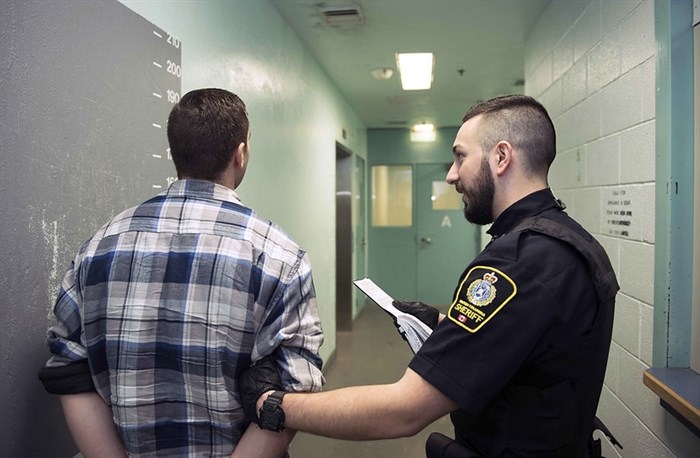
FILE PHOTO
Image Credit: SUBMITTED/Province of BC
October 20, 2023 - 3:30 PM
The union representing B.C.’s sheriffs says they should get an extraordinary pay raise to address a years-long staffing shortage weighing down the province’s courts.
BC General Employees’ Union treasurer Paul Finch says the province should take that step before the next round of bargaining to stop an ongoing exodus of sheriffs, the law enforcement professionals charged with protecting prisoners, judges and members of the public in the province’s courts.
“We strongly believe that we need to see these measures implemented prior to the commencement of collective bargaining to prevent further issues in administering justice,” Finch said.
Dozens of court cases in B.C. have been postponed or cancelled this year because no sheriff was available to protect the court.
A July internal report said a years-long recruitment and retention problem was caused, in part, by sheriffs quitting their jobs to take better-paying positions at municipal police agencies, whose starting annual salaries are sometimes roughly $20,000 more than what sheriffs make.
One of the report’s recommendations is to increase sheriff pay to at least $85,000. Their current starting pay is less than $63,000.
The province has since instituted a $10,000 recruitment and retention bonus for the province’s 400-odd sheriffs, something that falls outside the collective agreement between the BCGEU and the province.
A provincial spokesperson said they anticipate that will cost government more than $6.4 million this fiscal year and more than $4.7 million the year after.
B.C. Attorney General Niki Sharma said that increase “gets them closer to the compensation that they should be getting” and that the province would work to “embed that into their pay.”
But she did not say when that might happen and said she couldn’t predict what would happen in negotiations for a future contract, which would not take effect until 2025.
Sharma acknowledged a need for pay rates to line up with municipal police services, which often pull from a similar pool of candidates interested in law enforcement as a career. A starting constable in the Vancouver Police Department, for example, will earn roughly $78,000.
“They [sheriffs] are great recruiting grounds for police services and other correctional services,” Sharma said. “We need to make sure we are competing.”
Sharma did not say how much she believed such measures might cost or what government might be willing to spend, but she said the alternative was continued delays in the justice system.
“What I could say is that there are costs that are involved and associated with trials being delayed as well,” she said. “It’s an investment into our justice system.”
The sheriff service has struggled to recruit for years.
In 2008, a report commissioned by the BCGEU found a huge portion of sheriffs were frustrated by staffing shortages. Nearly half worked other jobs to make ends meet.
The July report, which Sharma’s government commissioned, identified similar problems. It found many sheriffs were frustrated with their management and believed incidents of sexual harassment and bullying had gone unchecked.
Sheriffs who spoke to the report investigators said they have “repeatedly raised issues with managers and senior leaders, but it seems as if complaints and suggestions fall on deaf ears, as nothing seems to change.”
“Many deputy sheriffs are convinced that sheriff leadership knows what the problems are and could do more, but they are choosing not to,” the report said.
“Many staff members feel that there is resistance to change at the senior leadership level. They believe that leaders seem unwilling to make the effort to push for change or that they are comfortable with the status quo because it benefits them.”
Sharma said government is now evaluating the recommendations from that report, which also include making the sheriff service its own stand-alone division.
She said problems in the service stretch back for decades and that government needed the report to “get to the bottom” of what needed to change.
“My goal is to make the long-term fixes so this problem doesn’t reoccur again,” Sharma said.
Finch said part of the problem was that many people see the sheriff service as a stepping stone to other jobs that pay better, offer more paths to advancement and offer more interesting work.
One of the July report’s recommendations was to diversify sheriffs’ workload by allowing them to do jobs like serve outstanding warrants, something their counterparts in Alberta already do.
“We want to see the sheriff service enhanced and developed into a branch of law enforcement that is not a waypoint, but is a destination,” Finch said. “I think that’s the critical thing — it needs to be designed to be a destination for a career.”
Sheriffs often transport or supervise accused offenders with violent histories and complex mental health and substance use needs. But Finch said that when it comes to salary, their jobs are often in a similar bracket as administrative positions also represented by the BCGEU.
Finch said that pay disparity will eventually need to be hammered out at the negotiating table but the government should not wait until the next round of bargaining to intervene.
“We do believe the attorney general is taking it seriously,” Finch said.
Sharma said there had been some “preliminary signs of hope” in recent months.
The province issued a news release last month boasting the service received 644 applicants over the summer term, more than double the two previous intakes.
The release said the service had also reduced travel requirements and costs for the application process and had created a dedicated recruitment team to attract more people to the job.
“The message to sheriffs is: we are taking action on this,” Sharma said.
— This story was originally published by The Tyee.
News from © iNFOnews, 2023